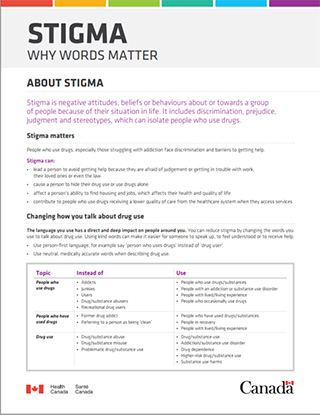Stigma: Why Words Matter

Download the alternative format
(PDF format, 127 Kb, 2 pages)
- Organization: Health Canada
- Type: Fact sheet
- Date published: June 2022
About stigma
Stigma is negative attitudes, beliefs or behaviours about or towards a group of people because of their situation in life. It includes discrimination, prejudice, judgment and stereotypes, which can isolate people who use drugs.
Stigma matters
People who use drugs, especially those struggling with addiction face discrimination and barriers to getting help.
Stigma can:
- lead a person to avoid getting help because they are afraid of judgement or getting in trouble with work, their loved ones or even the law
- cause a person to hide their drug use or use drugs alone
- affect a person's ability to find housing and jobs, which affects their health and quality of life
- contribute to people who use drugs receiving a lower quality of care from the healthcare system when they access services
Changing how you talk about drug use
The language you use has a direct and deep impact on people around you. You can reduce stigma by changing the words you use to talk about drug use. Using kind words can make it easier for someone to speak up, to feel understood or to receive help.
- Use person-first language, for example say 'person who uses drugs' instead of 'drug user'
- Use neutral, medically accurate words when describing drug use
| Topic | Instead of | Use |
|---|---|---|
| People who use drugs |
|
|
| People who have used drugs |
|
|
| Drug use |
|
|
There are three types of stigma
- Self stigma happens when someone internalizes messages about people who use drugs and apply them to themselves
- Social stigma is negative attitudes or behaviours towards people who use drugs or towards their friends and family
- Structural stigma is policies in health and social services that increase stigma and barriers to getting help
Help end stigma
Take these important steps to help reduce stigma:
- do not define any person by their drug use
- be respectful, compassionate and caring to those who use drugs
- educate your friends and family - pass on facts and challenge stereotypes
- remember that addiction is a treatable medical condition, not a choice, and is deserving of care just like any other medical condition
- be aware of your attitudes and behaviours because they may be influenced by stereotypes, negative stories and images about people who use drugs
This document was created in discussion with people with lived and living experience, through existing research and documentation from other organizations trying to address stigma. This is not an exhaustive list. As discussions evolve around the best language to accurately describe substance use, this list may be revised.
Page details
- Date modified: